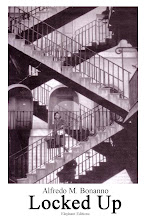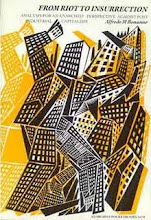Printed by Elephant Editions 1974
Although The Conquest of Bread is undoubtedly one of the fundamental classics of anarchism, its present day validity is not as certain as it is linked to a precise situation of class struggle which cannot be easily clarified by referring to the analyses contained in the present volume.
Put it aside? Consign it to the pleasing research of the historiographers, ever capable of giving a semblance of life to what has long been dead? Make a great task of separating the wheat from the chaff, patiently pointing out the parts that are still valid and those that are decidedly out of date? And, in such a case, what would remain of the unity of the work which, although accidental as it consists of pieces written at different times, cannot fail to leap to the eyes of even the most casual reader?
These doubts are basically unfounded. The Conquest of Bread has its unitary key to reading which does not seem to have been brought out even in the recent American edition introduced by Avrich, and this key allows for its legitimate use, not as a monument of the past, but as a tangible indication of something lasting and continually in transformation which the power structure manages to hide with varying degrees of difficulty.
Every possible good has been said of Kropotkin, and such a good man was he that nothing else could have been said of him: His conception of life, his optimism, his olympian scientific coolness of analysis, heating up every now and again with some incitement to rebellion: basically all that might seem out of date. And The Conquest of Bread is a book that could appear outdated. Except that the destruction of power is not the schematic process we usually entrust to great explosions of violence, or to small attacks against the structures of repression. The destruction of the constituted order also passes through the slow and optimistic evaluation of the forces available for attack. If it does not take much to accomplish an individual act, often a result of desperation, only reflection and analysis can render that act comprehensible and transform the desperation of the exploited into organised revolutionary force.
And in order to do that there is a need for profound optimism. Not in things or in men, for which there will always be someone ready to point out with superiority those who do not merit that optimism, but in the will of the individual who sums up and recomposes himself as part of the complex project of revolutionary totality.
It is here that we find, or so it seems to us, the key to reading this book, which makes it a whole. Solidarity is a biological fact - says Kropotkin - and, like a seed hidden by a snowy mantle, it lies dormant all winter to come to life again in the spring, so this essential principle of humanity endures the anguish of tyranny to reawaken in the sunshine of the future revolution. Many present-day thinkers have doubts about this. Not so much by referring to the secular thesis of men preying on each other like wolves, as by submitting the too idyllic late eighteenth century scientific vision to the critique of an historical materialism that regards (at least until recently) biology as the devil does holy water. The historical forms of the distribution of production relations contribute to determining society, therefore to the individual.
Good? Bad? Neither good nor bad? The only thing certain would seem to be a proposal for intervening. What should we do in the precise historical conditions of the present day? How should we act in a moment such as this with the class struggle still going on?
Strangely, one would try in vain to find an organisational outlet concerning aspects of the revolutionary struggle in The Conquest of Bread. What to do, before the revolution, in order to get closer to it? How organise? Syndicalism? A federation of affinity groups? What about clandestine organisations?
However did Kropotkin forget about all that? Because, attentive readers of this book would reply, it is a book that concentrates on the problem of what to do at the moment of the revolution and in the period immediately following it, on how to organise production and distribution. And they would be wrong.
The great subject animating the pages of The Conquest of Bread is the movement of the exploited: nothing is conceded to this or that historical group of intervention. And anar chists, as a conscious minority, find a place there only be-cause they are a part of that great movement, not as the representatives of a specific organisation in terms of political space.
This apparently banal fact has been considered by Kropotkin's critics to be due to his olympic superiority over the parts in struggle within the revolutionary movement, and to prove this they point out passages where Kropotkin underlines the difference between anarchists and collectivists, or between anarchists and authoritarian socialists. Moreover, the critics insist, this is due to a defect in analysis itself, a limitation that can be traced to Kropotkin's temperament, disposition and studies, his love for the traditions of the past, from the medieval era to the French revolution. As if not indicating a precise political position were the great sin that everyone would have us believe, like insisting on the political growth of this or that part of the movement being the great step forward that it is so often claimed to be.
It seems to me that Kropotkin was convinced of something far more important: that the revolution would be impossible if it were not already in course. To consider the revolution as something we shall meet some fine day out of the blue, beyond some line that it is not possible to cross today, is a Blanquist myth, that is foreign to Kropotkin and to all anarchists. This is a really important concept, and it does not matter that Kropotkin could not see its ultimate consequences, just as he could not justify the reasons that suggested it to him. This is an immense task that we are undertaking day by day at the level of the class struggle between exploiter and exploited, and from which we can draw the material indispensable for the continuation of the struggle.
Let us explain better. Kropotkin's point of departure is the scientific determinism of his time: science was to solve everything, would transform man's condition, finally subtracting him from exploitation because he would possess the truth, which is synonymous with wisdom. Nature itself, of which science was not only the interpreter but also the consequence and premise for every future investigation, could not be malevolent otherwise it would not have produced an instrument of liberation. Man can be free because he has in him the conditions for liberation, a natural condition of goodness: the rest are accidents due to the mistaken application of nature's suggestions.
From a political point of view this perspective clearly re-quired further support. And the old Hegelian adventure - less credited in countries of fishermen and pirates such as England - had ended up in the social democratic party. The development of science could not include that of the organisational forms both of capitalist dominion and prole-tarian counterpower preceding the revolution. The latter only became possible by going through the first stage (economic/ trade union) to a wider, more comprehensive level, that of the political party.
The fact that the continental marxists lived this adventure on the traces of a clash with the newborn but potent teutonic bourgeoisie, was certainly not without consequences. It will never be known to what extent these vicissitudes influenced the elaboration of their theory and, parallely, in what way marxist theory was subject to the apparent conquests of German social democracy. We can only see quite a clear rela-tionship between scientific determinism and political party. But a large proportion of anarchists, with Kropotkin in the lead, were also determinists, and they opposed themselves to the current that insisted on the role of Malatestian voluntarism. Would it be legitimate to deduce that the first were, underneath it all, advocates of a workers' party and the second were not? Such a conclusion would be mistaken. Unfortunately in this field appearances are as deceptive as ever. It was determinism that led the marxists to a quantitative evaluation of their original analyses thus contributing to strengthening the social democratic party while awaiting a clash which could in no way come about by that road. It was the same determinism, with all its scientific errors and limitations (and what analytical model does not have them?) that led the anarchists to a recognition of the movement of the exploited, of the revolutionary process in course, here and now, the progressive drawing in of forces working in one way or another for the self-organisation of human freedom.
On the other hand, that voluntarism that in some marxists emerged as a foreign body or a strategic and demagogical element to be used opportunely, or ended up (in the better Marx) by contradicting the basic thesis without ever seriously putting it in doubt; it was the same as the voluntarism which, with all its declarations for freedom and the inviolability of the individual, and all its good faith when present in those nearest the reality of the struggles such as Malatesta, could not fail to end up in the objective organisation of the anarchist workers' party.
The points of departure were different, the motivations and objectives were different, but the quantitative illusion is identical. The project of growth, the strategy of waiting and the strategic attack managed and coordinated by an organisation to be constructed not over the masses (valid for the marxists), but among them, perceiving economic moments of suffering and disgust towards exploitation, but always as something that must still be well placed, still fulfill a function, find political space; all while waiting for events to mature. Because none of the magnificent utopia of the revolution is visible today; because, when necessary, everything can reduce itself to an act of will capable of opening up the darkness that envelopes the struggle.
Malatesta accused Kropotkin of having put the international anarchist movement to sleep, proposing an ideology of waiting because, in any case, the revolution "will come". Only that accusation should have been directed not so much at Kropotkin's theses and the way they were formulated, so much as to what the movement wanted to read into these theses. They wanted to wait, and they found justification for doing so; they wanted to suspend their involvement following the apparent uselessness of the hot period of propaganda by the deed, and they found justification for doing so; they wanted an alibi for the interventionism against the central Empires, and they found it. Basically, a theoretician is not only a point of reference, is not only what he himself considers to be as a point of reference in his own work, but is also what the reality of the struggle ends up producing: and there was no other way that his works could be read during these years. The patriarchal figure of the scientist had forever overborne the strong characteristics of the agitator and rebel. The times no longer required the words of one who had even exalted the use of the "dagger, the pistol and dynamite" against the exploiters of the people.
Inversely, in Malatesta, the movement could have rediscovered the insurrectional teachings of Matese. The im-pulse of the will to destroy power in every form and on every occasion, suspicion towards agreements and defeatism, the need for organisational instruments of attack and defence. But it did not want that, it wanted progressive numerical growth, and it found justification for it; it wanted the regulat-ed organisation of economic defence, and it found justifica-tion for it; it wanted a form of party that aimed at righting the sins of the marxist one, and it found it there.
So the misunderstanding dictated by the needs of the class struggle are born, grow and become history. It is easy to pass over them without understanding them.
We often prefer to go for the obvious rather than immerse ourselves in these meanderings. Kropotkin, the determinist scientist, responsible for putting a brake on the international movement, is cast aside and condemned in block; Malatesta, heir of the true teachings of the indefatigable agitator Bakunin, the revolutionary asserter of the organisational capacity of the proletariat, theoretician of the will happy to espouse the workers' organisation, should be placed in opposition, therefore accepted unquestioningly.
This in no way contributes to clarifying the struggles that are taking place now.
Take, for example the English neo-Kropotkinians. They have taken to digging under the snow again to find that tiny seed that the geologist and explorer Kropotkin says he has seen. And they insist, often with pathetic monotony, on seeing it here and there, sometimes in the curious degenerate form of the structure of capital, sometimes in the social-democratic attempt to make the masses participate in decisions concerning their own exploitation. By acting in this way it is obvious that one betrays not the word but the profound meaning of Kropotkin's thinking.
Take, for example, the Malatestians of our own country [Italy]. They are continually reprinting The Anarchist Program, the formulation of an historical moment that has now become crystallised in the form of a catechism that resists any attempt to carry it into the field of present day struggles. In better moments they hasten to bring out new catechisms, counting and recounting the comrades who declare their acceptance of these programmatic lines, and arguing behind the scenes about the interpretation of some abstract problem such as violence, which in itself would not be abstract, but becomes so if whoever is examining it has no intention of violently attacking the State but only of continuing to argue about the problem.
The characteristic of Kropotkin's indications is therefore not only that beneficent optimism which is a fruit of the dreams of the science of his time, but is also, and principally, his capacity to see the revolutionary project as totality, sub-tracting it from any attempt to entrust it to natural evolution, or to the violent decision of a minority group.
But this totality is profoundly contradictory, does not permit deterministic models, just as it does not permit voluntaristic incitement. It accepts only man, history, and the economic and social relations that link the first to the second. Within the revolutionary totality the movement finds its sense of direction, -becomes process and project, tends to remove the obstacles constructed daily by the forces of reaction, undergoes apparent defeats that are substantially victories, constructs immense victorious achievements that are in fact heavy defeats. It digs melancholy trenches amidst symbols and banners, amidst colours and betrayals, to find the way that others - the carriers of the truth of the temple - insist on pointing to elsewhere. All that would be impossible if the final dream were not reality as of now, a partial and distorted reality, so much so that the more one tries to translate it into terms that are comprehensible to our limited capacities, the
more it hides itself, to re-emerge dressed in the symbols of ideology.
Here resides the illogicality of the revolution, and it is this that Kropotkin, man and scientist of his time, could not see clearly. But in this also lies our task today. To avoid this contradictory problem would also mean to definitively consign The Conquest of Bread to the dusty atmosphere of the library.
skip to main |
skip to sidebar

Some writings of Alfredo Maria Bonanno in English, or almost

Alfredo Bonanno was arrested on October 1st 2009 in Greece, accused of concourse in robbery. With him, anarchist comrade Christos Stratigopoulos.
Here are a few translations and part translations of a small portion of Alfredo's writing. This is a work in progress, many of the translations are as yet incomplete. Open links to find more of Alfredo's work.
Alfredo Bonnano Released
Nov. 22 Alfredo Bonnano was sentenced to 4 years imprisonment (which practically means that with the time served so far and the fact that he is over 70years old HE IS RELEASED
Christos Stratigopoulos (who took responsibility for the action)
was sentenced to 8 years and 9 months with the Greek law will probably be released at the end 2011
BY ANY MEANS NECESSARY
LINKS
click on any of these labels to read text
- "Community" sickness
- 1981 - Editorial
- A Critique of Syndicalist Methods
- A few notes on Sacco and Vanzetti
- A few notes on the revolutionary movement in Italy
- A little man in Singapore
- A million jobs
- A question of class
- Affinity
- After Marx autonomy
- Albania Laboratory of Subversion (Introduction)
- Anarchism and the national liberation struggle
- Anarchists and action
- AND WE WILL ALWAYS BE READY TO STORM THE HEAVENS AGAIN (Against amnesty)
- ANTI-INSTITUTIONAL MOVEMENT
- Are we modern?
- Armed Joy
- ARMED STRUGGLE. SOME REFLECTIONS.
- Autonomous base nuclei
- beyond syndicalism
- Beyond workerism
- But what is the imaginary?
- Class War
- Comiso - Organizational document of the self-managed leagues
- Considerations on illegality
- Dissonances (Introduction)
- Elephant Editions 1986
- Excluded and included
- Farewell to claiming
- Feral Revolution (Introduction)
- FICTITIOUS MOVEMENT AND REAL MOVEMENT
- For an Antiauthoritarian Insurrectionist International - Proposal for a debate
- From riot to insurrection
- From the centre to the periphery
- Good technology
- Guerilla Extraordinary
- Habits and idols
- Hegel
- I know who killed chief superintendent Luigi Calabresi
- Illegality
- Illness and capital
- Informal organisation
- Insurrection
- Internationalism
- Introduction to Sabate
- Introduction to Anarchism and Violence
- Introduction to Bratach Dubh English edition of Malatesta's Fra Contadini
- Introduction to Insurrectionalist Anarchism
- Introduction to Strange Victories
- Introduction to The Conquest of Bread
- Involuntary aspects of voluntary work
- Let's destroy work
- LET'S DESTROY WORK. New introduction
- Let's keep our feet on the ground please
- Lightening Conductors and Stand-ins - more shots of non-news
- Lightning Conductors and Stand-ins
- Lightning Conductors and Stand-ins (cont.)
- Locked up
- Looking forward to self-management
- Loss of language
- More on internationalism
- National Liberation Struggle
- nineteen years on
- No more crises
- Non-news about drugs
- Non-news about racism
- Ode to the Uniform
- On Feminism
- One's life on the line
- Order and chaos
- Otto Ruhle (Introductory Note)
- OUR ROLE IN THE PRESENT CONFLICT
- Palestine mon amour
- Pantagruel anarchist review
- Pinelli
- Prison and Prisoners’ Struggles - Introduction
- Propulsive Utopia
- Quality and the factory
- Restructuring Capital and the new democracy
- Revolution - Violence - Antiauthoritarianism
- REVOLUTIONARY VIOLENCE
- Science and the social revolution
- Self-management
- Severino Di Giovanni in Argentina 1923-1931 by Osvaldo Bayer
- Social banditry
- SOME NOTES -
- Space and Capital
- Stirner
- Stop the City? From information to attack
- Strategy and Methods
- Streamlined production
- The "end" of the crisis
- The aesthetics of anarchism
- The anarchist tension
- The area of autonomy and the anarchist movement in Italy
- The armed wing of science
- The Cruise missile base at Comiso can be prevented
- The ethical bank
- The insurrectional project
- THE LANGUAGE OF TECNICS -
- The logic of insurrection
- The moral split
- THE NECESSARY DESTRUCTION -
- The priority of practice
- The refusal of arms
- The revolutionary project
- The revolutionary struggle
- The significance of an insignificant event
- The struggle for self-managed social space
- The tyranny of weakness
- The whole and the part
- The young in a post industrial society
- Theory and action
- Towards anarchist antimilitarism
- TOWARDS THE GENERALISATION OF ARMED STRUGGLE
- TRANSFORMATION IN THE WORLD OF WORK AND SCHOOL -
- TRUTH -
- Unemployment in Italy - How come everything doesn't explode?
- Untitled
- Violence and non-violence
- What are anarchists
- What can we do with anti-fascism?
- Why a vanguard?
- Why Insurrection
- World domination in a few words











